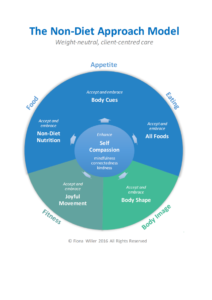BY: admin
Uncategorized
Comments: No Comments
The Non-Diet Approach – Weight Loss Is Not The Answer.
Kimberly Nelson, Dietitian, Change for Life
Weight loss counselling (essentially dieting) is the traditional treatment modality that Dietitians are trained in, despite flaws in the evidence base and evidence demonstrating that it is ineffective and can cause more harm than good. Research shows that dieting is almost synonymous with weight regain within 2-5 years (NHMRC, 2013; Mann et al, 2007). The Non-Diet approach (essentially weight neutral counselling) does not refute the associations between health and a higher weight but queries the causative factors driving them. A systematic review of 16 studies by Clifford et al (2015) demonstrated that a weight neutral approach resulted in weight stability at 5 years, improved biochemical markers, sustained healthy behaviours and improved psychological outcomes such as self-esteem, disordered eating and depression. Most importantly there were no negative outcomes.
The Non-Diet Approach is a paradigm based on the principles of Health at Every Size® (HAES®), which rejects the focus of weight as a determinant of health and sees it as a consequence of numerous factors affecting an individual’s health. It accepts and respects the natural diversity of body shapes and sizes; values eating in a flexible way by listening to our body’s internal cues; and moving for enjoyment rather than a desire to be thin. The Non-Diet Approach is the model of Dietetic practice of HAES®. It’s 5 core principles are grounded in accepting and embracing – body cues, all foods, body shape, joyful movement and non-diet nutrition to enhance self-compassion (see model below). Healthy behaviours like being physically active, eating the recommended serves of fruit and vegetables and having higher self-compassion, have more of an influence on a person’s health than their weight (Clifford et al, 2015). By taking this weight neutral approach with our patients and treating people with a BMI above the ‘healthy’ range the same as those considered to have a healthy BMI, we can reduce our own weight bias and improve our ability to actually help those who are stigmatised for being in a larger body.

